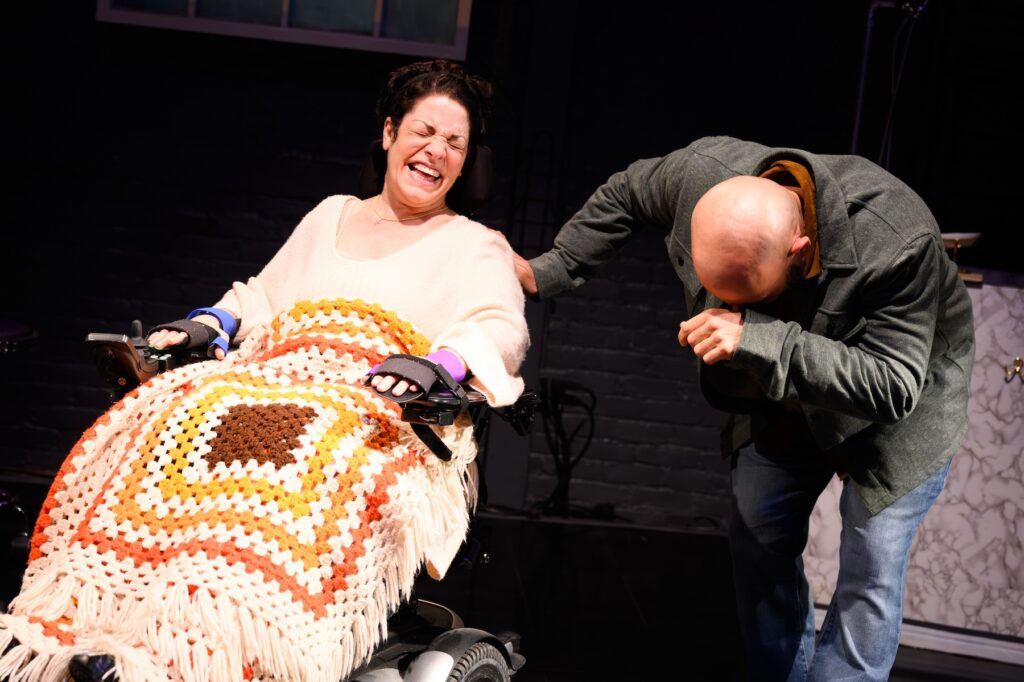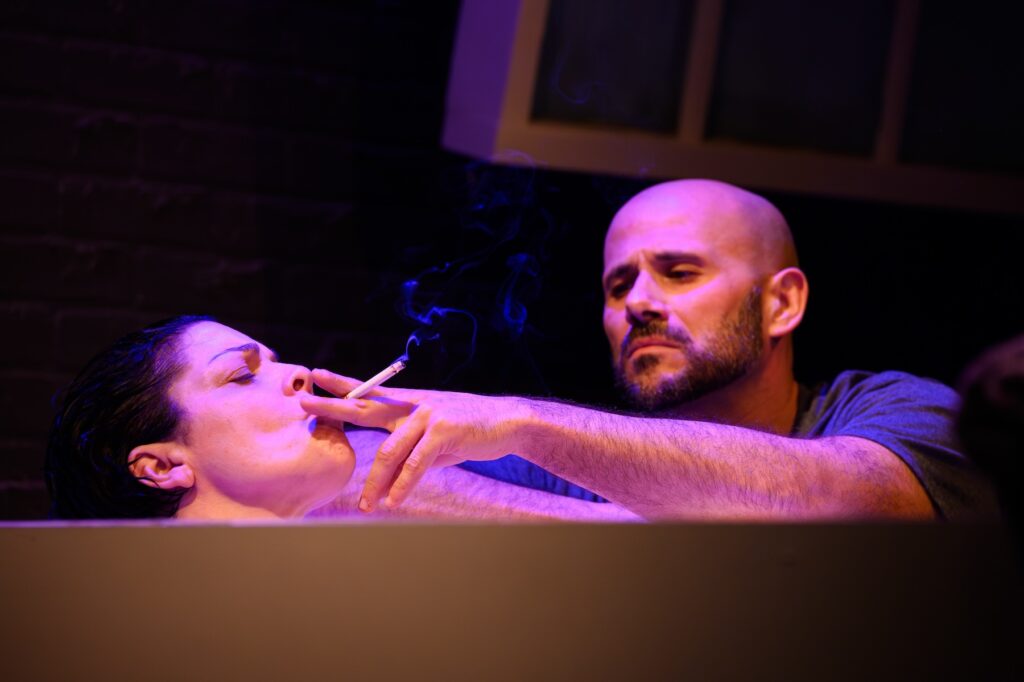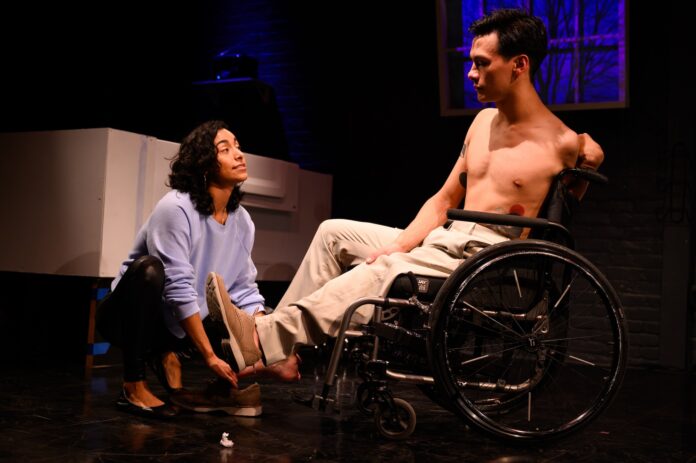There are few things as uniquely American as the way we always reject help. I’m sure someone will point out how we aren’t the only ones to adopt this trait, but few powerful nations in history have committed to Social Darwinism the way the US has, particularly in the past century-plus. We’re notorious for being the only contemporary super power to reject social programs the way a sick body rejects a transplanted organ. Hell, we’re now four years into a still-ongoing pandemic, and despite proving early on that affordable/free healthcare is lifesaving, our idiot leaders have ignored this lesson and made COVID safety just another for-profit venture. Yay, American exceptionalism.
Every character of Martyna Majok’s Cost of Living (Bay Area premiere through March 24 at FLAX art and design, Oakland) needs help. Every one of them is reluctant to admit it. They each succumb to the inherent shame Americans feel when not being able to do the impossible all on their own. They’re disgusted at the very notion of turning into one of “those people” always asking for hand-outs (the classic elitist myth perpetuated—if not outright created—by nepo babies and exploiters of the masses). In reality, there’s nothing wrong with asking for help; it’s just a question of asking before it’s too late.
Our souls in need of aid include Eddie (Daniel Duque-Estrada), a recovering addict and philanderer trying to build his life up again after the loss of both his truck-driving job and his wife, from whom he’s separated. In fact, it isn’t long until he’s once again seeing his wife, Ani (Christine Bruno), on a regular basis. After a car wreck leaves her almost completely paralyzed, she now requires round-the-clock care. Although she has access to regular healthcare professionals, Eddie offers to help; something Ani is hesitant to accept for multiple reasons.
Near Princeton University, we’re introduced to John (Matty Placencia), a wealthy sort who’s also disabled, though not to Ani’s extent. Nevertheless, he is in need of some assistance, so he reluctantly puts out a notice for a part-time at-home physical therapist. First to answer is Jess (Carla Gallardo), a full-time bartender who still needs cash (because America). Healthcare work is new for her, but John seems to take a liking to her beyond-her-years wisdom. When he asks her how much life she’s lived, she easily replies “A lot.”

As a character study in and of itself, the play works great. Director Emilie Whelan and her cast make us both believe and root for these folks who could all use a break. You wouldn’t know that Daniel Duque-Estrada (recently of The Magic and CalShakes) was a last-minute replacement for another actor, as he not only slips easily into the sadness of Eddie, but his chemistry with Bruno, a disabled actor though not paralyzed like her character, makes it easy to believe that these two share an uncomfortable history with one another. Similarly, first-timer Placencia, also a disabled actor, isn’t bad working with La Lengua Teatro regular Gallardo, giving us a believable glimpse into the former’s obnoxious privilege and the latter’s honed survival traits. One can accept the idea of accidentally walking in on the lives of these two couples during emotionally intimate moments.
Yet, the script can’t seem to stick the landing. As there’s no real plot, it’s no big deal that there’s no real denouement. Still, the conclusion falls into that tricky area where it seems the playwright simply had no idea how to end things. It has a hint of optimism that’s more than welcome after all that comes before it, but it’s an ending that peters out rather than naturally evolving. What’s more, neither of the two disabled characters/actors take part in it, save for mentions of what happened to them off-stage. It’s a fine scene for the two actors we do see, but for a story focusing so strong on characters with disabilities, it’s a bit too easy for the stage to be taken up by the two able-bodied characters/actors.

Speaking of the stage, Whelan also served as the play’s set designer. On a black-tiled floor are a handful of bathroom pieces—a sink, two different bath/shower set-ups for disabled access—that seem to exist outside of space. The white porcelain design of these pieces contrasts well with the blank space of the floor. In addition to the bowling ball-shaped white lights that hover above the set, there’s also an upstage window fixture that serves as a projection screen. (Incidentally, the projector seemed to glitch a few times on opening night. Fortunately, the performances were enough to hold our attention.) All in all, a design that says a lot with a little.
On a note related to the topic of disabilities: this night was a bit easier in terms of attempting to avoid disabilities (or death) potentially resulting from COVID. OTP recently changed their “masks always” policy of the past few years, adopting the current theatre trend of specific masking performances—in this case, Fridays. Fortunately, this opening night was on a Friday and everyone (eventually) masked up. Over the course of the 1-hour 40min show, my Aranet4’s CO² readings peaked around 1334ppm, dropping down to about 1185ppm by the final bow.
Cost of Living is an imperfect show, but it’s also a show about imperfect people. Neither factor really seems to cancel out the other, but you also can’t observe one without being conscious of the other. If anything, it shows how well OTP can, at their best, make imperfect material compelling to watch. Sure enough, this is a talented cast that needs to be seen.
COST OF LIVING’s Bay Area premiere runs through March 24 at FLAX art and design, Oakland. Tickets and further info here.







